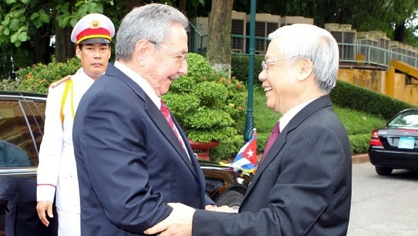New stage in friendly, comprehensive cooperative Vietnam-Cuba relationship
Vietnamese President Tran Dai Quang’s visit to Cuba at the invitation of Cuban President Raul Castro marks a new stage in bilateral ties, helping to strengthen the time-honoured solidarity and friendship and comprehensive cooperation between the two countries.
 |
| General Secretary Nguyen Phu Trong and Cuban President Raul Castro during the latter's visit to Vietnam in 2012. |
Situated in the Caribbean, Cuba has a population of more than 11 million and comprises more than 1,600 islands with a total land area of 113,524 square kilometres. The country is rich in natural resources and its fertile land is suitable for farming and large animal husbandry. Cuba also possesses many natural and cultural assets conducive to the development of tourism.
Many years ago, Cuba was faced with economic difficulty due to long-standing US sanctions. In recent years, the country has also felt the impact of the global economic crisis. Nevertheless its economy still maintains its momentum for growth, having accelerated from 1.9% in 2010 to 4% last year. Services exports and tourism continue to be the key drivers of growth.
The Sixth Congress of the Cuban Communist Party in 2011 was a significant milestone, as it saw the adoption of a new direction for Party policy with a focus on updating the country’s economic model to maintain and build upon the achievements of the Cuban revolution, stimulating growth and improving the people’s standard of living. In April 2016, the Seventh Party Congress conceptualised Cuba’s socialist socioeconomic model of development and affirmed the continuation of the process of “updating the economic model.”
Cuba pursues a peaceful and independent foreign policy, expanding international cooperation and contributing to the world’s development in an active and proactive manner. Despite facing economic difficulty, Cuba still upholds the spirit of proletarian internationalism, standing ready to support sister countries, especially in the fields of healthcare and education. Cuba has restored diplomatic relations and maintained dialogue with the US. However, the normalisation process remains difficult given that the US’s economic embargo on Cuba is still in place. The UN General Assembly’s adoption of resolutions calling for the end of the US embargo on Cuba for the past 25 consecutive years indicates the international community’s broad support for Cuba, giving more strength to the Caribbean country on its path of development.
The Vietnam-Cuba relationship is a time-honoured friendship between two peoples who are both comrades and brothers, sharing the same revolutionary ideal originating from the lofty thought of President Ho Chi Minh and Cuban national hero Jos Marti.
The Vietnamese people have always treasured, allied with and supported the Cuban people during the past more than half-century of the glorious history of the Cuban revolution under the leadership of the Cuban Communist Party, headed by Fidel Castro and President Raul Castro. The Vietnamese people will always remember the wholehearted support of Cuba, the pioneer of the progressive world’s movement to support Vietnam’s struggle for national independence. Cuba also pays heed to fostering a multifaceted cooperative relationship with Vietnam. To Vietnam, Cuba is a bright example of revolutionary heroism and the aspiration for freedom and social justice. Vietnam always looks to Cuba with tremendous admiration and empathy.
Since Vietnam and Cuba established diplomatic relations in 1960, their relationship of solidarity, mutual support and comprehensive cooperation has been continually strengthened. The two sides frequently exchange delegations and maintain cooperative mechanisms such as the Vietnam-Cuba Joint Committee, the deputy-ministerial defence policy dialogue and political consultation. Vietnam’s projects to assist Cuba in agriculture and aquaculture have yielded positive results. Trade and investment cooperation is going in the right direction. The two countries’ Governments encourage and facilitate the operations of enterprises so as to expand cooperation to bring their economic relationship to the same level as their political ties. The two countries also work closely and support each other at international organisations and multilateral forums.
President Tran Dai Quang’s official visit to Cuba is an opportunity for the leaders of the two countries to exchange opinions and reach agreement on specific plans to foster bilateral cooperation in a new stage of development in each country. The visit once again affirms that Vietnam is determined to work with Cuba to further strengthen the brotherly solidarity and comprehensive cooperation between the two Parties, States and peoples, contributing to world peace and development.
(Source: NDO)
.
 về đầu trang
về đầu trang







